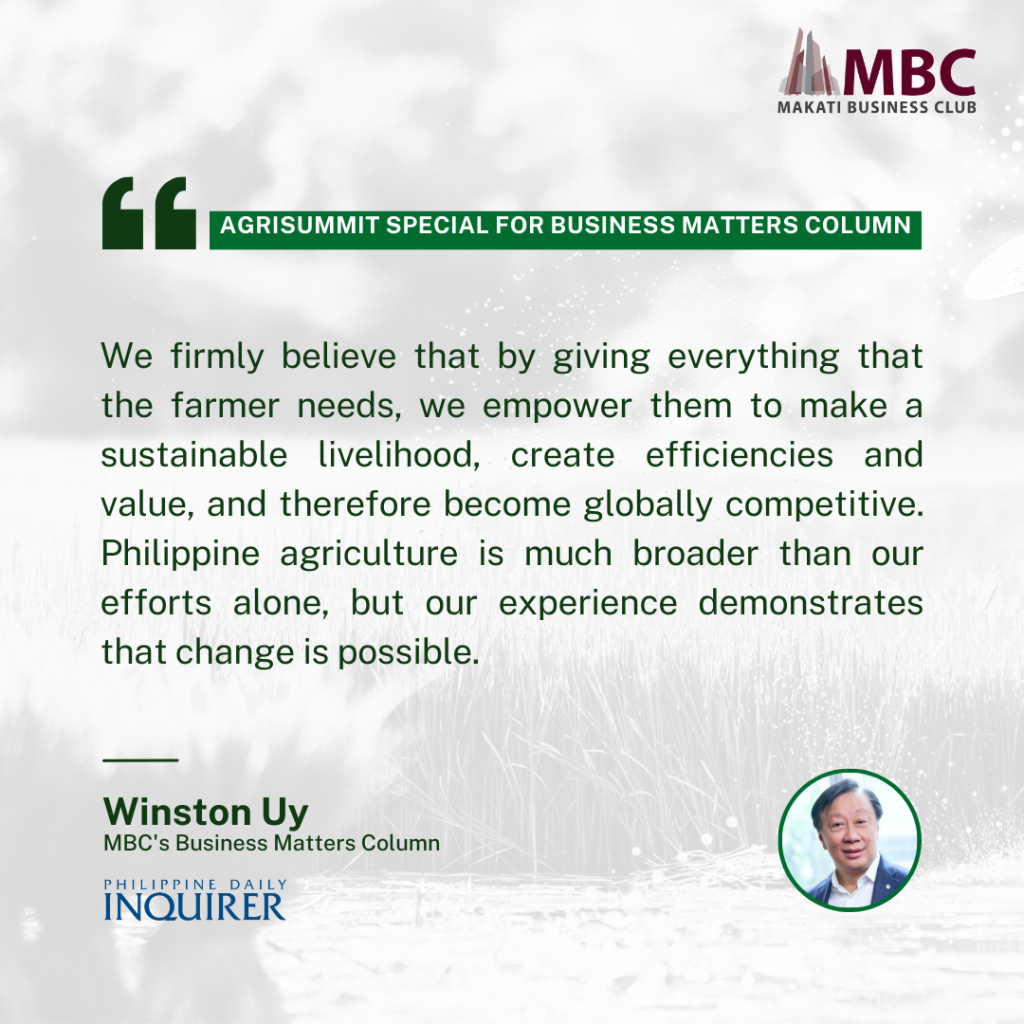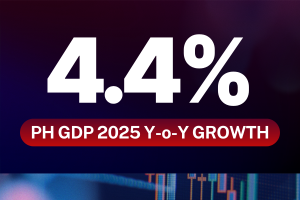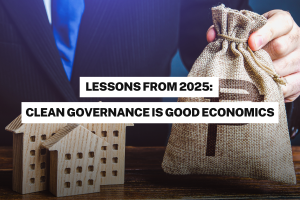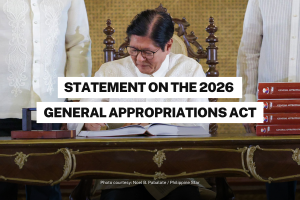Business Matters Column
Transformational Agriculture: From Traditional
to Globally Competitive

22 August 2024 – Agriculture has long been an important part of the Philippine economy. For generations, Filipino farmers have been trapped in a cycle of debt, burdened by both the physical demands of farming and the financial risks. It is a complex and unfair structure of buying and selling by layers of middlemen – who tip the scales of inequity even further by employing practices that benefit neither the farmer nor the buyer. This is the reality for every crop in the country, but it doesn’t have to be this way.
My journey in agriculture began three decades ago when I confronted the harsh realities of the Philippine agricultural landscape. In the 1990s, I attended a World Trade Organization meeting where the topic was the removal of tariffs on agricultural products, promoting free international trade. The prospect was daunting—we were not equipped to compete on the global stage. The only options were to adapt or face devastation.
The solution, as I saw it, was to empower farmers. While most agricultural businesses focused on marginal improvement on factory yields, I believed that real change could only come from working directly with farmers. Over the past 30 years, this approach has been risky but has yielded significant benefits for everyone, especially the farmers.
Even today, businesspeople say that it is too hard to work with farmers – they are too difficult, too hard to change. My response is simple: between us and the farmers, we have better education, more resources, and greater exposure. Yet, farmers are the ones bearing the burden of everything that can go wrong in the growing process. To work with farmers means taking responsibility for them, finding solutions, while holding them accountable for their work. This shift in mindset was crucial in transforming our operations and, in turn, changing the socio-economic structure of the tobacco industry in the Philippines.
The question was “How do we make our farmers succeed?” and the answer did not come easily. The first decade was marked by more pain than gain, with many mistakes along the way. However, these mistakes were less costly than the inefficiency of staying the same. It was a continuous process of trial and error where at the end of every crop we ask ourselves “How do we make it better?”.
The first significant change was restructuring the value chain – it must be aligned on what the market needs. In an industry where many players strive to dominate, I believe that everyone should be rewarded according to the risks that they take and the amount of labor and work they contribute.
We began by working directly with just 50 farmers, learning each year how to better support them in producing a high-quality crop. This involved providing them with everything that they needed, when they needed it. They trusted us to provide the necessary inputs and guidance, and we trusted them to deliver a good harvest. This trust has allowed us to grow our relationship with 145,000 farmers and farm workers.
At the same time, we invested in something very new at that time – digitalization. Initially, this was an expensive endeavor, so we tried to build it on our own. We made costly mistakes, but this approach enabled us to refine our processes year after year. We focused on finding solutions to our challenges, and every success was institutionalized into a digital platform. Our digitalization efforts needed to be weather-centric, financially focused, process-driven, and communicated throughout the value chain. Today, our program is in its 25th version, reflecting 25 years of experience in finding solutions and implementing best practices.
These are just a few examples of the many changes we have implemented. What sets our experience apart is the willingness to take risks and make difficult changes. We firmly believe that by giving everything that the farmer needs, we empower them to make a sustainable livelihood, create efficiencies and value, and therefore become globally competitive.
Philippine agriculture is much broader than our efforts alone, but our experience demonstrates that change is possible. Whether it is rice, corn, or other staples, the challenges of achieving self-sufficiency and affordability are well-known. Yet, our journey proves that with structural change and a commitment to continuous improvement, these goals are within reach.
I hope that more people will believe in this potential and become engaged. On September 16, at the event titled “Food is Everyone’s Business: MBC’s Agriculture and Food Security Summit 2024,” we will have the opportunity to learn more and exchange ideas.
This article was published on Philippine Daily Inquirer under MBC’s Business Matters Column on August 22, 2024. Business Matters is a project of the Makati Business Club.

PH Economy Grew at 4.4% in 2025, Lowest Post-Pandemic Growth Recorded
PH Economy Grew 4.4% in 2025; Lowest Post-Pandemic Growth Recorded 29 January 2026 — Philippine Gross Domestic Product grew by 3.0% in the fourth quarter

Lessons from 2025: Clean Governance is Good Economics
Lessons from 2025: Clean Governance is Good Economics 26 January 2026 – 2025 started off with a major controversy surrounding the National Budget, which had

Statement on the 2026 General Appropriations Act
Statement on the 2026 General Appropriations Act 05 January 2026 – The 2026 General Appropriations Act, signed today by the President, represents an improvement compared

